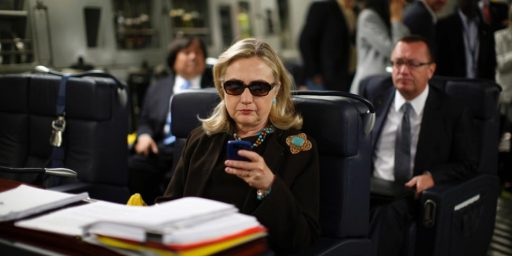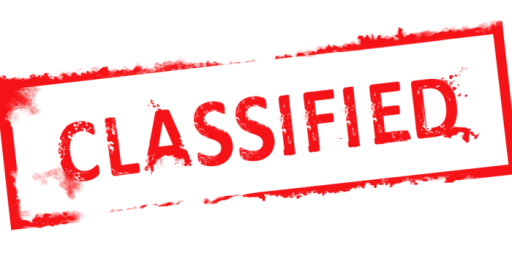Tension Over Press Leaks
David Broder finds the recent investigations into those who leak classified information to the press troubling.
This is a troubling case for those of us in journalism. Our view is that it’s the government’s responsibility to keep its secrets secret and that it’s our responsibility to ferret out information so the public is aware of the actions being taken in its name.
I agree. That’s why it’s leakers, not reporters, who are being investigated. The only issue with reporters is the extent to which they should be required, like other citizens, to comply with subpoena’s commanding their testimony.
We recognize there are sometimes legitimate national security considerations for withholding information. In the case of Priest’s stories, The Post agreed to the government’s request not to identify the countries where the secret prisons were located. But we also know that administrations of both parties tend to restrict information — and that the only way for the public to learn of questionable policies or actions is for conscientious individuals to break that official code of silence.
Government has a legitimate claim to enforce the promise of confidentiality that officials sign when they go to work for an agency such as the CIA. The tool of enforcement can be humiliating and distasteful — and a lie detector test is both. But its use is not unprecedented. When there was talk of polygraphs for top officials in the Reagan administration, the secretary of state, George Shultz, said he was prepared to resign — and the prospect disappeared.
The tension between the legitimate claims of secrecy and the need for public accountability remains, however, and in many respects has grown worse. The main reason is the reluctance of this president and his administration to accept a broad and continuing responsibility to keep the public and the press informed on the reasons for the policies they have adopted.
This conflates two wholly separate issues, however. Granting that the classification system is sometimes abused, keeping secrets because one has a duty of loyalty to the president vice because one is sworn not to divulge classified information are entirely different. The former is a breach of personal trust; it is not illegal.
While the president has a duty to the public to inform us of his public policy views, it is not absolute. Surely, he does not have to reveal sensitive clandestine activities that we are trying to keep secret from our enemies. One can not simultaneously tell the American voter about these things and keep them secret from al Qaeda.
We have a system of checks and balances that is supposed to protect against abuses. Leaks of classified information to the press are not, despite what the Fourth Estate might think, part of that system. Congressional oversight committees are.
If an employee becomes aware of a policy which he finds questionable on legal, moral, or even policy grounds, he has a chain of command. If that fails, he has access to Congress–whether at the committee level for higher level employees or at the personal representative level for more junior ones. If he feels these routes are too slow or has tried them and found them unresponsive, he might then chose to break his oath and the law. That decision, however, comes with consequences.





I heartily disagree with the conclusion that reporters shoud get a pass on being held accountable for passing on secret information to the public. If a reporter is aware of the sensitivity of the information some traitorous jerk is passing to him, he still has a responsibility to the nation to protect vital secrets, IMO. Just because one is a reporter does not mean that any and all information he receives should be published openly. This holds for the editors and owners of the media also. Whoever said that reporters have an absolute free pass? Rediculous!
Your last paragraph is exactly where I come down on this issue, James. It concerns me that every federal employee with a grievance abandons legitimate process and is hailed by somebody as a courageous whistle blower.
However, I also think that while the natural predisposition of every executive is to classify as much as possible a free society requires that as little as practical be concealed from public scrutiny. The default condition should be unclassified rather than the other way around.
Well, One of my jobs in the USAF is dealing with security. Here’s a direct quote from a training briefing I just got, that I get to relate to my colleagues tomorrow:
So here’s a discussion topic: What exactly should one do when one is presented with a situation in violation of a Presidential Executive Order? What if it’s classified to the point that you cannot legally report the violation? What if the President himself is involved in the violation?
“Cannot legally report” it to whom?
The CIA has its own office for reporting illegal activity. It’s the very office where Mary McCarthy used to work. If anyone ought to have known her permissible options, it’s McCarthy.
Even the few reps and sens on the intelligence committees felt they could not speak to anyone re Bush’s illegal wiretapping activities without potentially revealing “classified” information, however illgal the program may have been. They had no way to investigate it. That was the sinister beauty of the way the neocon leadership “informed” Congress of the program.
Exactly my point, Roger. Telling someone you’re doing something illegal, but they can’t report it, and them blaming them for tacitly approving your crimes. It’s a one-of-a-kind taste combo of Orwell and Catch-22, brought to you by the Bush administration!